Lessons from the Frontlines: Park Managers Shaping Central Africa’s Wild Heart
Lessons from the Frontlines: Park Managers Shaping Central Africa’s Wild Heart
From the Congo Basin to the savannas of Rwanda, two veteran park managers share decades of lessons on leading from the field, building trust with communities, and keeping conservation alive where it matters most.
Estimated time to read: 12 minutes
Countries involved: Rwanda, Democratic Republic of Congo, Central African Republic, Congo-Brazzaville
Organizations involved: African Parks, WWF
With more than three decades of experience managing parks in Central Africa, often in challenging conditions, Luis Arranz and Ladis Ndahiriwe are well-placed to take on the role. They know each other well, and there is a deep mutual respect between them. They both participated in our training programme, sharing their experience in the courses that took place in Gonarezhou and Akagera national parks in 2023 and 2024 respectively.
Born in Spain, Luis studied biology and always knew he wanted to work in Africa. His career has taken him to Equatorial Guinea, Chad and the Central African Republic. When Luis visited us in Gonarezhou, he was 67 years old and acting as park director for Salonga in the DRC and Dzanga-Sangha in the Central African Republic. He has worked in some of the most challenging regions. While working as a park manager in Garamba (DRC), he lost 37 rangers, but they rescued more than 50 children who had been kidnapped and were being forced to become child soldiers.
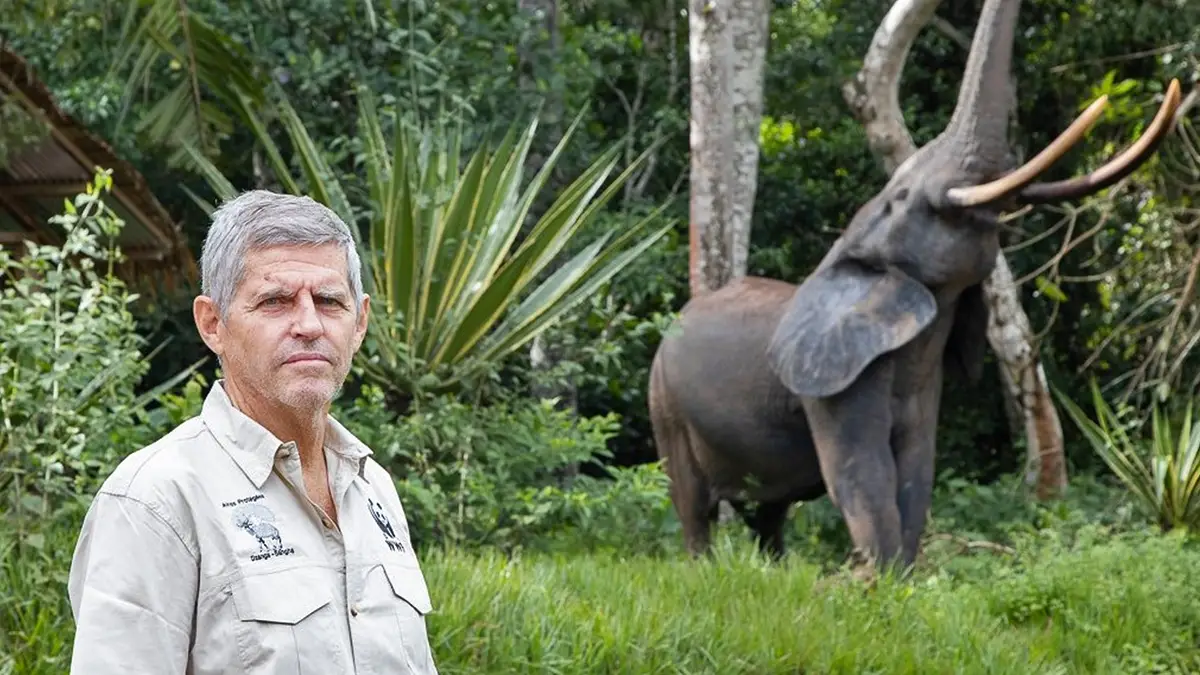
Luis Arranz
Luis’s message is clear: park management happens on the ground, not in offices. He refuses to attend most conservation workshops and international conferences, preferring to spend three-quarters of his time inside the park. ‘The most important thing for a park manager is to stay in the park as much as possible… Of course, we should take holidays and rest for a few days, but the main danger is spending most of the time travelling and attending meetings outside the park’. He made an exception to come to our course, however, because he knows how important it is to train a new generation of park managers willing to live in these remote places.
Fortunately, his efforts are paying off. In Dzanga-Sangha, a park in Central Africa where the nearest city is 18 hours away by road, elephant killings dropped from 40 per year to fewer than 10. Luis says, ‘We pay rangers 50% more, but there are two red lines: no poaching and no human rights abuses. Cross them, and you’re out.” And his team isn’t just saving forest elephants and lowland gorillas. They are also running mobile clinics, funding university degrees for Baka youth and building a football pitch with floodlights so villagers can play after dark.
“The young people told us, ‘You built a school and a hospital, but nothing for fun,’” Luis recalls. “So we built a football pitch.”
There’s a real commitment to improving local conditions in Dzanga-Sangha. For decades, the Baka, indigenous forest dwellers who are often disparagingly referred to as ‘pygmies’, were treated badly by neighbouring Bantu communities. They were denied identity cards and voting rights and were forced to work in exchange for bottles of beer. Luis’s team has turned things around. They established a human rights centre, and lawyers now visit Baka camps weekly. They helped secure official IDs for the Baka people, enabling them to travel, vote and access services for the first time. They pay school fees, send teachers into the forest during the season for harvesting caterpillars, and run mobile clinics offering ultrasound scans.
And it’s working. “Now the Baka inform us when poachers arrive,” says Luis. ‘They see that the park protects their rights — and their future.’ During the pandemic, when borders closed and panic spread, Luis made a bold choice: he fed 6,000 forest-dwelling Baka people with weekly food drops. No invoices. No paperwork. “Brussels wants receipts for every bag of rice,” he says. ‘But if I wait for paperwork, people die. My job is to keep the park — and its people — alive.”
Meanwhile, tourism is quietly transforming the economy. At just $300 per permit (compared to $1,500 in Rwanda), Dzanga-Sangha offers visitors the chance to get up close to gorillas in almost untouched wilderness. Crucially, the Central African government allows the park to retain all revenue, 40% of which flows directly to communities. This money funds cooperatives that rent out cars to tourists, sell handicrafts and arrange homestays. Locals now have a stake in keeping the gorillas alive. “If people see that having a national park is slightly better than not having one, they will support it.”
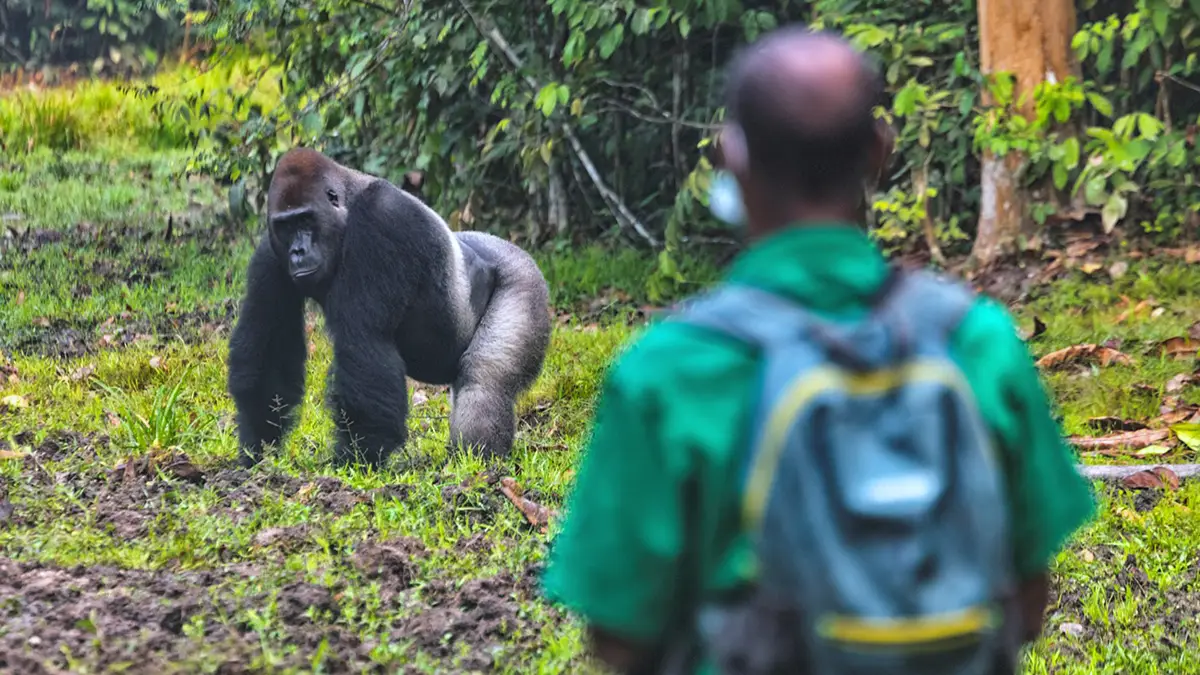
Gorilla watching in Dzanga-Sangha.
But none of this would be possible without one key change: the transfer of real authority. Since WWF signed a 25-year management agreement with the government, Luis has had full control over budgets, staffing and operations. He champions this delegated management approach and is becoming cautiously optimistic. ‘Fifteen years ago, I thought we were going to lose everything in Africa: the elephants, the rhinos, the national parks… everything. But since then, all these things have increased (as a result of the new delegated management agreements)”.
Luis sleeps in the bush with his rangers. He shares their risks. When the World Cup final is on, he projects it onto the wall of his house so that the whole village can watch — because joy is as important as protection. ‘You can’t lead from an office,’ he says. ‘If your team suffers, you suffer with them. That’s how they know you’re one of them.”
Yet his greatest frustration isn’t poachers or pandemics; it’s the empty chair. At 67, Luis Arranz should be retired, sipping coffee in his Spanish hometown, watching his beloved rugby and spending time with his daughter. However, he continues to take on critical roles because qualified and willing successors are almost non-existent — most of his trained deputies leave for safer and more comfortable lives abroad after just a few years.
Young professionals spend years training, only to leave for consulting roles based in cities. Before Salonga National Park had a director, it had €50 million in donor funding. For four years, organisations searched in vain. Why? Because the most experienced professionals choose well-paid short-term consultancy roles over working and living in the parks of the Congo Basin.
What advice does he have for the next generation? ‘You don’t need to stay in places like Salonga or Dzanga Shanga for 20 years. But give it seven. Stay in the park. Remember: conservation isn’t about producing perfect reports; it’s about improving the lives of people and wildlife together.”
In his talk, Luis conveyed a powerful message: effective conservation only happens when leaders stay in the field, build trust with local communities and prioritise real impact over bureaucratic compliance or reports designed to please donors. His candid reflections challenge the current incentives in the conservation sector, which often favour consultants over on-the-ground managers.
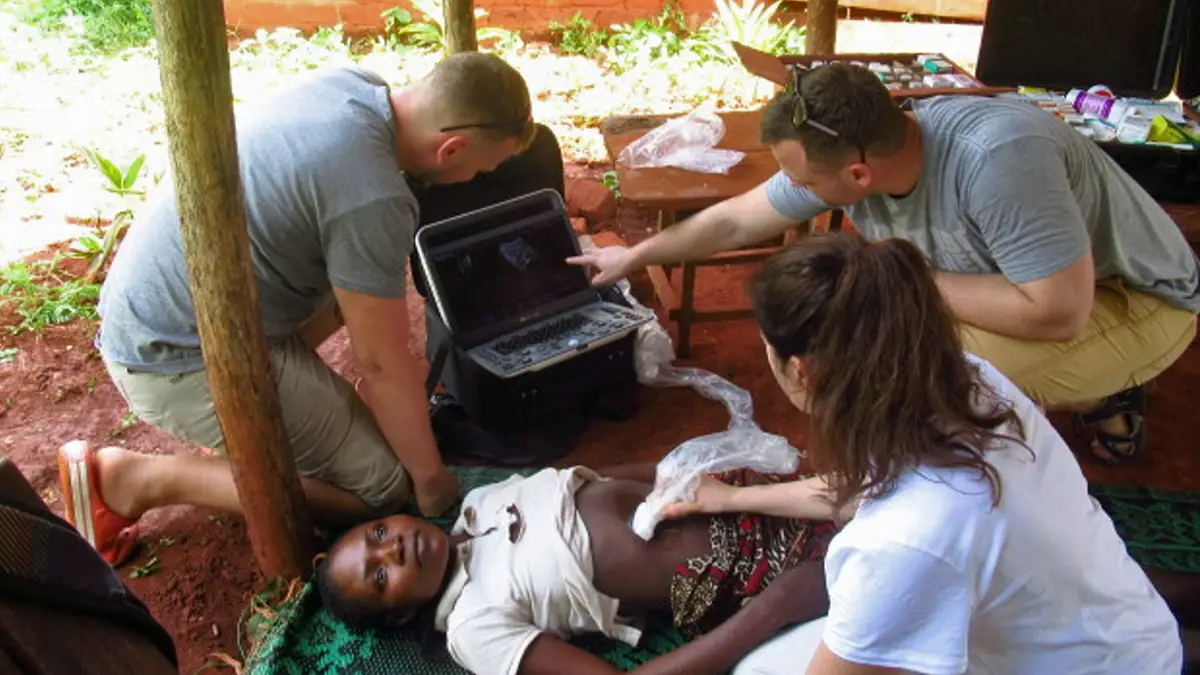
The Dzanga-Sangha team providing medical assistance to baka woman.
In 1994, Rwandan-born Ladis Ndahiriwe appeared to have it all: a stable engineering job with Caterpillar corporation in Belgium, ten years’ experience in Europe, and a comfortable life. Then a friend called from the Congo Brazza rainforest with an offer to join a conservation project. Ladis says “My Cat Employer said: “Go for three months. If it’s not for you, come back”
Ladis went. And he never returned.
‘After three months, I knew for sure that this was the job for me.’
Today, nearly 30 years later, he is one of Africa’s most respected park managers. He has led operations in Odzala, Zakouma, OMO Valley, and Garamba national parks, and is currently doing the same in Akagera National Park in his home country. But his journey hasn’t been easy. It began in a tent with no running water, no electricity and no guarantee of safety.
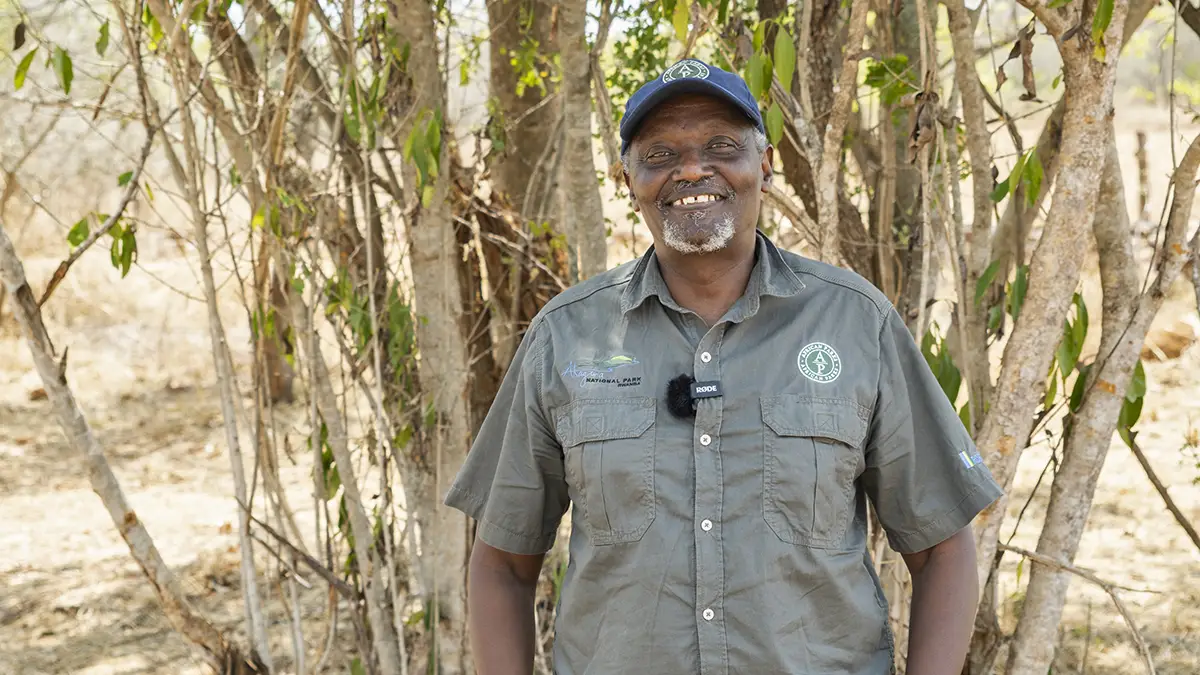
Ladis Ndahiriwe
‘You’re probably going to spend three years in the tent,’ he says. ‘But after that, something changes. Conservation gets in your blood.’
Ladis has watched countless well-meaning outsiders arrive full of ideas, only to leave within a few years due to bureaucracy, isolation or the slow pace of change. ‘They want to do everything at once,’ he explains. ‘But they don’t take the time to understand the culture, the land or the people. When reality hits, they break.’
Conversely, many African professionals hesitate to enter conservation because they don’t start out with the same level of passion. ‘How can I spend three years in a tent?’ they ask. ‘I have a family to feed.’
Ladis doesn’t dismiss that concern. But he insists: true impact requires endurance.
“There is no secret. You must live it. You must suffer it. Only then does it become part of you and you end up having quite a good position.”
For five years, Ladis managed Garamba amid a storm of violence. Congolese soldiers, Ugandan soldiers and the LRA rebels were all operating in the same forest. Many of them were underpaid and resorted to poaching to survive. His rangers weren’t just tracking elephants; they were also forging fragile alliances with people who could just as easily kill them.
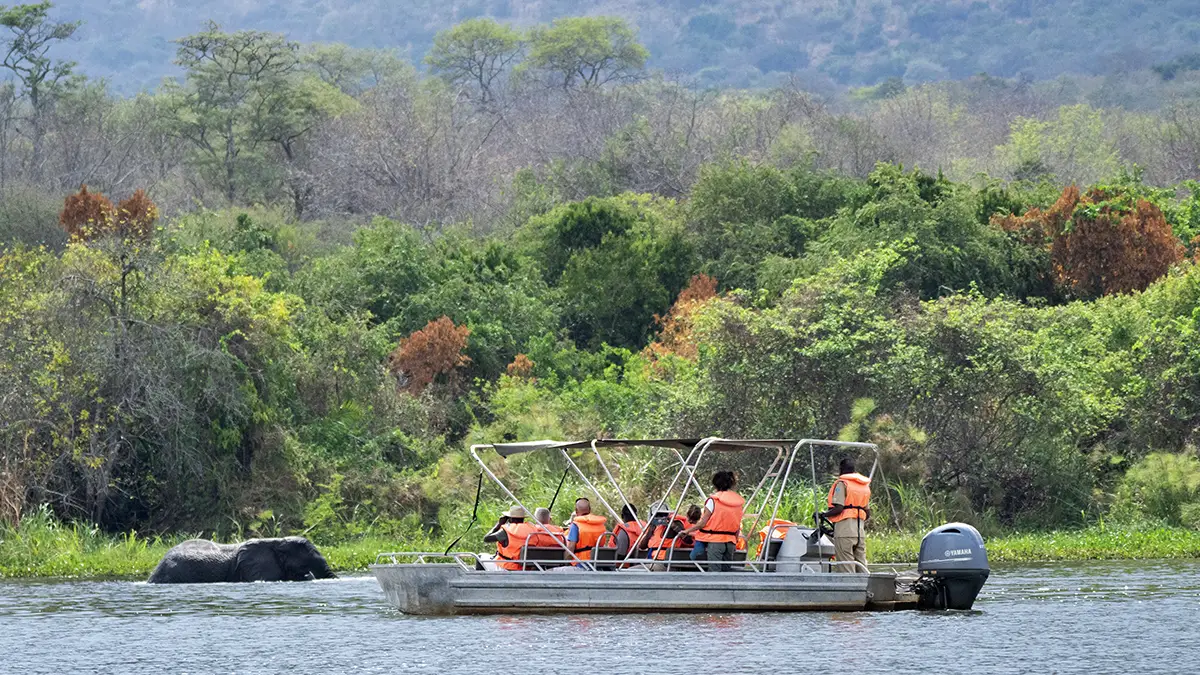
Visitors to Akagera National Park.
“You can’t send your team into an area without knowing who’s there,” he says. ‘You talk. You listen. You find common ground — even if it’s just by exchanging a jerry can of petrol.’
However, Ladis’s greatest revelation didn’t come from the battlefield. It came from Rwanda.
In 2010, Akagera National Park was on life support. Genocide against the Tutsi, civil war, poaching and neglect had wiped out its lions and other wildlife. Local communities saw the park as a barrier, not a benefit. Today, lions roar again. Rhinos graze freely. Tourism revenue has also surged to over $4 million annually.
What changed? Similar to the situation in Dzanga-Shanga, albeit earlier in time, the Rwandan government entered into an agreement with African Parks to delegate the management of the park. Unlike short-term donor projects that disappear after five years, leaving behind empty offices and broken promises, Akagera operates under a 20-year management agreement between the Rwandan government and African Parks. Crucially, the government mandated that 10% of all park revenue be reinvested in surrounding communities, plus other 5% to compensate for human wildlife conflicts.
‘It’s 10% of the entire park’s income,’ Ladis explains. ‘And the communities decide in which projects to spend it.’
The result? Schools are being built. Health clinics have been upgraded. Youth cooperatives launching guiding activities for the visitors, craft shops, beekeeping, fishing and more. People now see the park as a partner in their prosperity, not a threat.
This is in stark contrast to Ladis’s earlier work in the Odzala National Park in Congo-Brazza, which was flooded with EU funding for seven years, only to collapse when the money ran out. ‘We invested millions in roads, rangers and research, but we forgot about the people,’ he admits. “Without community buy-in, conservation is just a temporary bubble”.
In Akagera, communities aren’t passive beneficiaries; they’re co-owners.
Ladis and his team don’t simply hand out cash. They help communities to set up businesses, such as car rentals, homestays and guided walks, that generate income long after the tourists have left.
“I won’t give you $1,000 to solve a problem,” he says. “But I’ll help you build a lasting solution.”
Every village around the park has a grievance box. Drop an anonymous complaint in it, and within days, a committee will investigate. If the park is at fault, they fix it. No bureaucracy. No blame. Just accountability. “Trust isn’t built in meetings,” says Ladis. ‘It’s built when you admit you’re wrong and put things right.’
‘Everywhere I failed, it’s because we didn’t plan well enough to establish a long-term vision with the local community. I think this is the first thing to consider when managing a protected area. We work for conservation. It’s our primary mandate. But don’t forget that you’re living with people. That’s going to account for 50% of your success. I say this because I’ve seen the difference in the projects where I’ve worked. Here, in Akagera National Park, I especially saw the power of working with communities.’
In Akagira, Ladis also discovered what had been missing from every other park he had managed: a government that truly shows up. ‘Rwanda doesn’t just sign agreements — they invest. $1 million a year and 10% of all tourism revenue goes straight to communities by law.’
And it works. While other parks struggle with human-wildlife conflict, Akagera’s buffer zones are peaceful. Rangers are respected, not resented. When the park needed support during the pandemic, the communities stood with them.
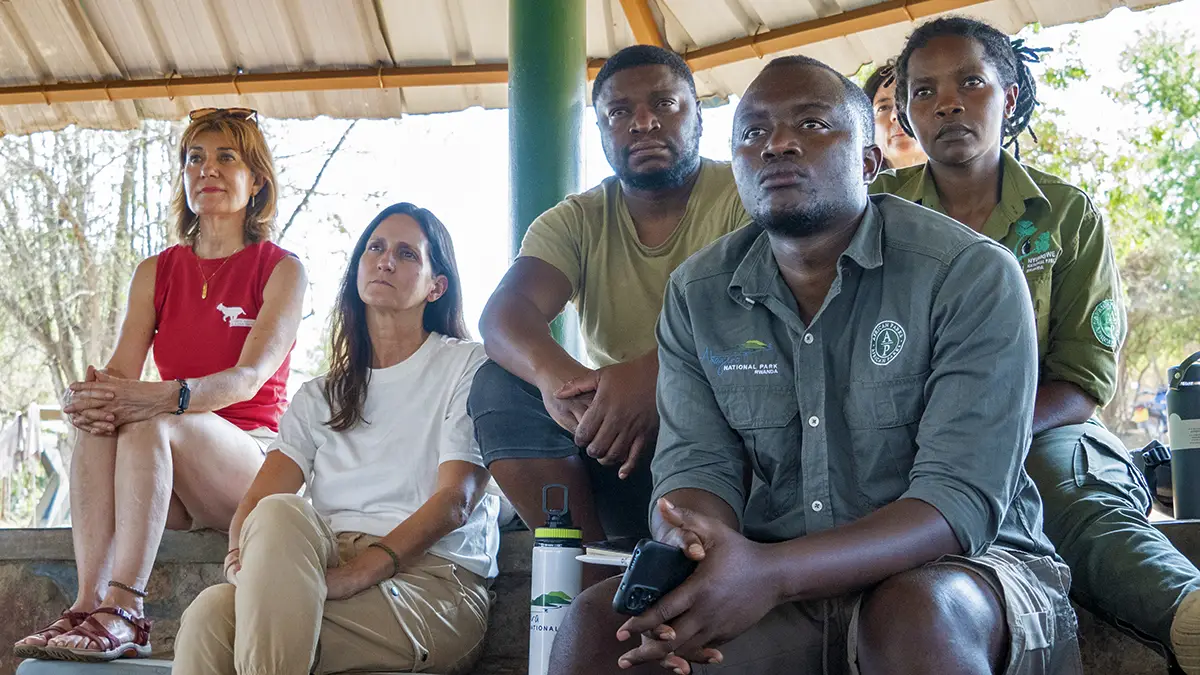
ECTI participants listening to Ladis in Akagera park.
Ladis identifies three essential pillars for any conservation project: a strong team, community engagement, and a committed government. “You need a very strong team: well organized, knowing what they are doing, and with lots of competence”
What is Ladis’s advice to conservationists, whether they are African or international?
Don’t get involved in conservation for money or to boost your CV.
Don’t just count wildlife. Count relationships. Because, ultimately, parks survive not by fences, but by friends.
Do it only if you’re ready to stay when everyone else leaves.
You can watch and listen for Luis’ and Ladis’s presentations in our leadership course by accessing our YouTube channel. It provides a good listening in long drives or while going for a walk!
Insights: Key Messages and Practical Learnings
- Presence is power: Long-term, consistent presence in the park builds trust with rangers and communities and enables responsive, adaptive management.
- Simplify to amplify impact: Excessive reporting, high-end workshops in cities and consultancy often dilute resources and distract from core conservation goals. Focus on essentials: protection, community engagement, and transparency.
- Invest in people, not just wildlife: Ranger welfare (fair pay, clear ethical boundaries) and community rights (education, healthcare, legal support) are foundational to conservation success.
- Delegated authority works: When NGOs are given full management control via long-term agreements, outcomes improve dramatically (e.g., declining elephant poaching in Dzanga-Sangha, restoration of lions and rhinos in Akagera, or increased revenue and businesses at the local level).
- Conservation is a vocation, not a career ladder: Success requires deep personal commitment—often at great personal cost—and cannot be outsourced to short-term consultants.
- Cultural respect drives results: Supporting Baka cultural transmission (e.g., forest skills, language) while offering modern education creates choice, not dependency.
- Simplicity wins: Avoid over-engineered reporting; prioritize actionable intelligence and field presence over unnecessary documents.
- Diplomacy is a conservation tool: In conflict zones, rangers must be negotiators as much as protectors.
- Formalize community feedback: Anonymous grievance systems prevent resentment and enable rapid course correction.
- Government buy-in must be structural: Legal mandates (e.g., revenue sharing) and direct funding signal genuine partnership.
- Context dictates strategy: What works in Rwanda fails in Benin—leaders must diagnose the real threat (poverty vs. terrorism).
- Team integrity is non-negotiable: Competence, honesty, and resilience matter more than credentials or background.
Text prepared by Ignacio Jiménez with support from Rafa Abuin and revision by Luis Arranz and Ladis Ndahiriwe
Photos: Rafael Abuin and Dzanga-Sangha Project
Design: Andrés Stubelt
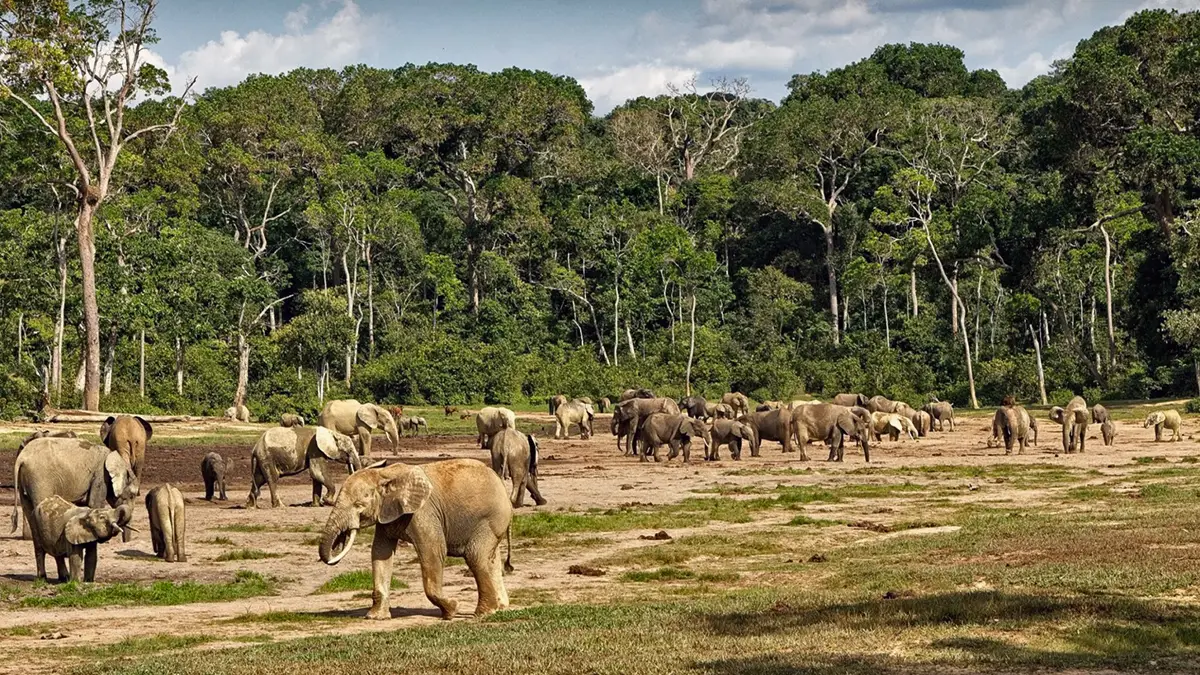
Elephants visiting a forest gap in Dzanga-Sangha
